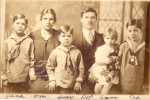 Your family has a story, a narrative. This story includes how and when the parents met, how the children came into the family (birth, adoption, foster, step…), positive times (vacations that went well, accomplishments, awards…), negative times (when someone lost a job, death of a pet, dealing with a disability, life challenges…), everyday life (favorite games, pizza night, birthdays…), core values (we worship weekly, nightly dinner together is important, we volunteer our time…), and much more.
Your family has a story, a narrative. This story includes how and when the parents met, how the children came into the family (birth, adoption, foster, step…), positive times (vacations that went well, accomplishments, awards…), negative times (when someone lost a job, death of a pet, dealing with a disability, life challenges…), everyday life (favorite games, pizza night, birthdays…), core values (we worship weekly, nightly dinner together is important, we volunteer our time…), and much more.
Instead of reading or writing about other people, read, write, talk about your family. Some people write about their families to preserve family history. Some people write about their families as a way to sort out their feelings and beliefs about their past.
Another important reason to read, write, or talk about your family is to help your children. Learning about or writing about family can provide them with a background for the family’s values and it can help integrate their place in the family.
Ways to tell your family story:
- Pick a segment of your family’s history (when Grandma and Grandpa first got married, when your child joined the family, the winter we got snowed in…), pop some popcorn, and turn telling the story into a family get-together.
- Turn your child’s story into a multi-part story that you tell them over several nights as you tuck them in. Tell them about when you first saw her. Share about his early milestones. Describe what you liked about her when she was little. Talk about his accomplishments. Project into the future and share your hopes for her future.
- Create a slide presentation, gather the family around, and get everyone to share memories and stories.
- Have your child create a book of their life or the family as they know it. Have them write or type it up, and illustrate it. It can be shared with the immediate family or given to grandparents as a gift.
A family’s narrative is important to everyone. But it can be especially important for newly-adopted or foster children to hear, or when the family goes through changes, whether positive or negative. Become a family that narrates their own story as a way to celebrate, join together, and move through challenges.
******
RESOURCE

Leave a comment